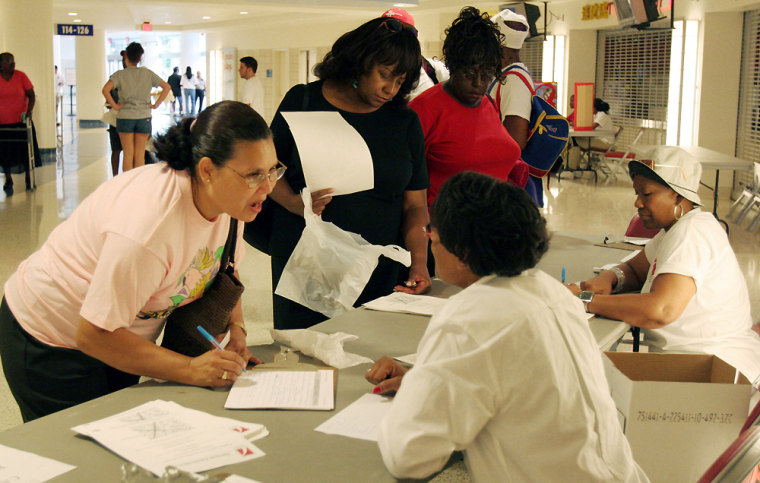The September employment report due Friday will reflect nearly the full impact of Hurricane Katrina, which wiped out hundreds of businesses and more than 300,000 jobs.
But many analysts already are looking beyond the report, in part because the broader and more lasting economic impact of the storm and its aftermath seems likely to come from higher energy prices.
The employment report is always followed closely by investors, economists and the public as the government’s first broad assessment of how the economy performed in the previous month. A surprisingly high or low figure Friday could shake jittery financial markets, which lately have been worried that the Federal Reserve will be forced to raised interest rates higher than previously expected to keep a lid on inflation.
But analysts caution that the September employment report could prove particularly hard to read because of difficulties posed by the widespread destruction caused by of Katrina. (The monthly report estimates the number of workers on payrolls as of the 12th of the month, so there will be no impact from Hurricane Rita, which made landfall Sept. 24.)
“It’s way too ambitious to imagine you can accurately measure employment amid a disaster like this,” said Citigroup senior economist Steven Wieting. “This is very messy data.”
So it is little surprise that estimates for September employment vary widely, with forecasters expecting payroll to show a loss of anywhere from 25,000 to 400,000 jobs.
On average economists expect a loss of 125,000 jobs, according to Thomson Financial. That would account for about 300,000 jobs lost to the hurricane, offset by 175,000 net jobs created elsewhere in the economy. The national unemployment rate is expected to show little change from the August level of 4.9 percent, partly because of a decision by federal statisticians that will minimize the Katrina effect.
So far about 363,000 people have filed for unemployment insurance because of Katrina and Rita, according to the latest weekly report on new claims, although not all of those would be covered in the monthly survey due Friday.
While the Bureau of Labor Statistics is likely to offer further guidance Friday, in a general a report showing the economy shed few or no jobs last month likely would be seen as a sign of unexpected underlying strength in the economy, which on average has added 190,000 jobs a month this year.
On the other hand, a surprisingly large job-loss figure could show the economy weakening outside the Gulf Coast region. That result is not widely expected.
“It seems to be the case that businesses outside the Gulf Coast are continuing to hire as if there was no storm, and hopefully in tomorrow’s report we’ll get confirmation of that,” said Mark Zandi, chief economist for Economy.com.
He and other analysts say the biggest negative effect of the two huge hurricanes likely will be the lingering impact of higher energy prices, particularly for gasoline, heating oil and natural gas. Many refineries and production facilities shut down by the hurricanes have yet to be restarted, leaving supplies well short of what is needed to satisfy demand in the immediate future.
“I think the main impact on the national economy is the effect the hurricanes had on energy prices,” said Goldman Sachs economist Andrew Tilton. “Spending on gasoline siphons consumer spending away from other items, and that is potentially a negative on the growth outlook.”
The higher energy prices is adding to inflationary pressures in the economy that will be evident in next week’s report on consumer prices. The high cost of gas at the pumps already has contributed to a record one-month drop in consumer confidence and seems to be hurting sales of big, gas-guzzling sports-utility vehicles.
Zandi said the shock of higher energy prices will mean a “tougher Christmas” for the nation's retailers, with sales expected to rise only 3 or 4 percent, compared with last year’s strong 7 percent.
But by next year, the Katrina effect could begin to boost economic output as money pours into the Gulf Coast region to rebuild homes, businesses and public infrastructure.
In some ways, Friday’s employment report will say nearly as much about government data-collection procedures as it does about the human economic toll of the hurricane.
The monthly report is a combination of two massive surveys conducted each month, in which researchers canvas tens of thousands of businesses and households nationwide to estimate the total number of people working or unemployed.
Because thousands of businesses and residences were destroyed by Katrina or impossible to reach during the survey period, the Bureau of Labor Statistics has had to make several adjustments to its normal estimation procedures.
For example, the bureau will assume that any businesses that cannot be contacted are out of business and have zero employees, an assumption that could overstate the loss of jobs in the region. However in the household survey, which is used to calculate the unemployment rate, the bureau will take the opposite tack and simply eliminate from its sample any homes that cannot be contacted.
That could underestimate the impact of the hurricane. The household survey will not cover the employment status of the tens of thousands of people living in emergency shelters, hotels and other temporary housing facilities.
